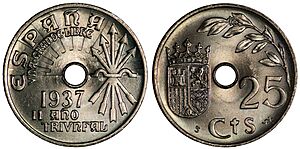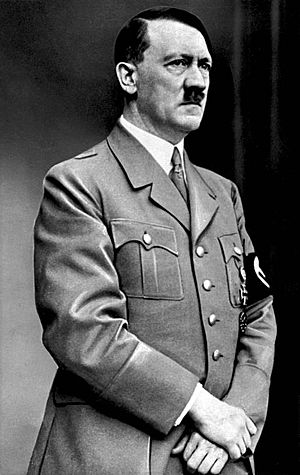Junta Técnica del Estado facts for kids
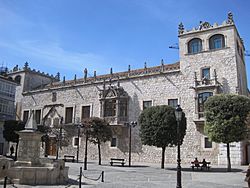 The Casa del Cordón in Burgos, headquarters of the Junta. |
|
| Agency overview | |
|---|---|
| Formed | October 2, 1936 |
| Preceding agency |
|
| Dissolved | January 30, 1938 |
| Superseding agency |
|
| Jurisdiction | Nationalist faction (Spanish Civil War) |
| Headquarters | Casa del Cordón (Burgos) |
| Agency executives | |
The Junta Técnica del Estado (which means Technical State Junta in Spanish) was a special group created by General Franco. This happened in October 1936, during the Spanish Civil War. Franco had just been made the leader of the rebel side, known as the Nationalists.
The Junta Técnica was one of the first main groups that helped Franco organize his new government. It was divided into smaller sections, like different departments. However, it wasn't a real government with powerful ministers. The people in it were not very well-known politicians. Generals Dávila and Jordana led it at different times. This group stopped existing in February 1938 when Franco formed his first proper government.
Contents
How it Started
The Spanish Civil War began in July 1936. The military leaders who started the uprising formed a group called the National Defense Junta. This group was in charge of both the military actions and the political side of the rebel movement. General Miguel Cabanellas was chosen to lead it because he was the most senior general.
This first Junta took control of all government powers in the areas the rebels controlled. They called these areas the "national zone." But soon, people wanted a single, stronger leader.
Franco Becomes Leader
On September 30, 1936, a special announcement was made. It named General Franco as the generalissimo (supreme commander) of the armies. He also became the head of the State government.
Franco officially took power on October 1. Even though he was only named head of government, official news outlets called him "head of state." This made his power grow even more. His main goal was to win the war. He wasn't in a hurry to create a full government. So, he decided to set up a group that was more about technical work than politics. This group was the Junta Técnica del Estado. He also relied on his brother, Nicolas, who became his general secretary.
The law creating the Junta Técnica and other groups was published on October 2. This was in the Boletín Oficial del Estado, which was the official government newspaper. The way the Junta was set up showed it was meant to be temporary. It was like a military support team to solve immediate problems. Its main job was to help the military win the war. People thought the war would end soon, so the Junta was not planned to be a long-term government.
How the Junta Was Set Up
The Junta Técnica had a president and several "commissions." These commissions were like small government departments. They dealt with different areas.
| Role | Person in Charge | Start Date | End Date |
|---|---|---|---|
| President | Fidel Dávila Arrondo Francisco Gómez-Jordana Sousa |
October 2nd, 1936 June 3rd, 1937 |
June 3rd, 1937 January 30th, 1938 |
| Justice Commission | José Cortés López | October 2nd, 1936 | January 30th, 1938 |
| Finance Commission | Andrés Amado y Reygondaud de Villebardet | October 2nd, 1936 | January 30th, 1938 |
| Industry, Commerce and Supply Commission | Joaquín Bau Nolla | October 2nd, 1936 | January 30th, 1938 |
| Agriculture and Farm Labor Commission | Eufemio Olmedo Ortega | October 2nd, 1936 | January 30th, 1938 |
| Work Commission | Alejandro Gallo Artacho | October 2nd, 1936 | January 30th, 1938 |
| Culture and Education Commission | José María Pemán y Pemartín | October 2nd, 1936 | January 30th, 1938 |
| Public Works and Communications Commission | Mauro Serret y Mirete | October 2nd, 1936 | January 30th, 1938 |
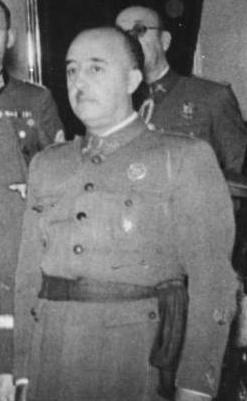
The way the Junta was set up was similar to an earlier government in Spain, the Military Directory from 1923-1925. It had commissions instead of full government ministries. The main office of the Junta was in Burgos. Even though it looked like a government, the people in these commissions were mostly focused on daily administrative tasks. They were not major political figures.
Since Franco was the ultimate decision-maker, all groups had to send their proposals to his office. This office was called the Secretaría General del Jefe del Estado. This made it easier for Franco to approve things. So, even though Dávila was the president of the Junta, the real power was held by Nicolás Franco, the General's brother.
By late 1936, the rebel side of Spain seemed like a new, organized state. All groups worked together to centralize power and be efficient. This was different from the Republican side, which was more divided. The next year, 1937, was tough for the war. But Franco's political power grew much stronger.
The President's Role
The Junta was led by a president. This person's job was to guide the group and talk to Franco. Franco was the final decision-maker. The president of the Junta would meet with the heads of the commissions at least once a week. The president would also send direct messages to Franco.
The president was always a military officer. This showed that Franco liked to rely on military people for political roles. The first president was Fidel Dávila. He was also the chief of the military's General Staff. Dávila had fought in earlier wars and was known for his skills. He was a professional military man who was loyal and honest.
The Commissions
- Finance Commission
This group mostly had military members. But it was led by Andrés Amado, who was a financial expert. He had worked with a previous finance minister. Amado wanted to change the value of the Spanish currency, the peseta. But Franco wanted to keep its value high. This helped keep prices stable during the war. Amado's skills helped the economy improve in 1937.
- Justice Commission
This commission was led by José Cortés. It was made up of legal experts. Its main job was to check existing laws. They wanted to remove any laws that didn't fit with the "New State." They also helped move from military law to regular civilian law.
- Industry, Commerce and Supply Commission
Joaquín Bau led this commission. He was a monarchist who had also worked with a previous finance minister. One of this group's jobs was to help supply the army. Bau had ideas about free markets and didn't like the government controlling too much. His expertise also helped the economy get better in 1937. This commission also made a rule that limited how much foreign money could be in Spanish mining companies. This rule made Germany, a close ally, a bit unhappy.
- Agriculture and Farm Labor Commission
This group was made up of engineers who specialized in farming. Its president was Eufemio Olmedo. In 1936, they made a rule that animals could only be slaughtered in official municipal places.
- Work Commission
This commission also had its main office in Burgos.
- Public Works and Communications Commission
Mauro Serret led this group. It was made up of government engineers. This commission also focused on technical tasks, not politics.
- Culture and Education Commission
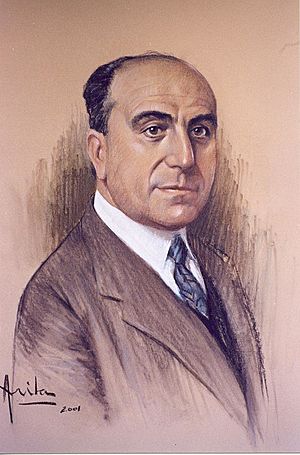
This was the most political commission. José María Pemán was its president. But he wasn't very interested in daily office work. So, the vice-president, Enrique Suñer, did most of the managing. This commission was known for checking on teachers. They looked at teachers' political and religious ideas, their teaching methods, and even their personal lives. They used reports from priests, mayors, police, and parents. The commission made the final decisions, and there was no way to appeal them.
Key Features of the Junta
Most of the top positions in the Junta were held by military men. Dávila and later Jordana were career military officers. But the members of the commissions were mostly civilians. This showed that the new system was mainly military-led. Franco was the head of state, and many other important roles were also held by military officers.
No members of the Falange, a political party, held positions in the Junta. Instead, there were many monarchists (people who supported a king). This meant the Junta Técnica was not a group that created a fascist state. It was more about Catholic or traditional Spanish values.
The people working for the Junta did not get extra pay. They only received their salaries from their previous jobs. This showed that the Junta was meant to be temporary. Everyone thought the war would end soon.
All new laws and rules had to be approved by Franco. These ideas could come from the Junta, but also from other offices. This sometimes caused delays. The Junta's commissions had limited power. They mostly dealt with urgent needs, not big reforms. Franco was much more focused on winning the war than on government matters.
Money Matters
The rebels got money by taking goods from groups and people who supported the other side. In January 1937, the Junta created a special group to manage these seized goods.
In November 1936, a Foreign Currency Committee was set up. Its job was to control money from other countries. In March 1937, this committee asked everyone to declare any foreign money, stocks, bonds, or gold they had. The new government controlled all foreign money exchanges. All exports were paid for in strong foreign currencies. This money was used to help pay for the war. The Burgos Royal Mint also got a lot of money from jewelry and valuable papers donated by people.
A New President
In June 1937, General Mola died in a plane crash. Franco decided that Dávila would take Mola's place as commander of the Army of the North. To replace Dávila as head of the Junta, Franco chose General Francisco Gómez-Jordana. Like Dávila, Jordana had fought in earlier wars. He had also been part of Primo de Rivera's Military Directory. Jordana was a monarchist, but he was seen as more "liberal" because he was older and not interested in fascism. He was loyal and honest, and Franco trusted him.
Jordana was not eager to take the job. He felt it was very difficult to manage. He thought Franco was too busy with the war to focus on political issues. He also felt that Nicolás Franco was acting without coordinating with the Junta. Jordana believed the Junta wasn't working well. He also saw that there was a political difference between the Junta (which had military men and monarchists) and the Movement (which was controlled by the Falangists).
So, in October 1937, Jordana told Franco that he should either make big changes to the Junta or form a proper government. Franco eventually agreed and announced that a new government would be formed soon.
Foreign Relations
There was a Foreign Relations office, but Sangroniz and Nicolás Franco were the ones who really handled foreign affairs. However, Franco always kept the main role in diplomacy for himself.
By June 1937, Spain owed Germany a lot of money for their help. Hitler wanted to get Spanish iron ore in return. In July, the Germans gained some economic benefits. Jordana and the German ambassador signed an agreement. Spain promised to sign a trade deal with Germany and give them special trade treatment. They also agreed to exchange raw materials and goods.
Spain also agreed to pay its war debt to Germany. German companies began to control trade, and the new German ambassador wanted to control all Spanish foreign trade, giving priority to Germany.
In October 1937, Franco issued a new law. It said that all previous agreements about mining rights were now invalid. This law was seen by the Germans as a problem for their interests. It stopped their money from being invested in buying mining rights. The Junta Técnica told them the law was meant to stop deals made by the other side. But the Germans were still suspicious.
Germany wanted to claim ownership of 73 mining areas because of the money they were owed. The October law prevented this. They asked to be treated the same as Spanish companies under the law. Spain refused, saying that the law only allowed a small amount of foreign money in mining companies. They suggested waiting for the new government to be formed.
In December 1937, the German ambassador met with Franco and his brother. Franco refused to approve all the mining sales at once. Later, the ambassador met with Jordana, who also refused a general approval. He promised to look at each case individually. The fall of Teruel in January 1938 made Franco's position weaker against his allies' demands.
Public Employee Checks
The Junta Técnica did not directly handle the more violent actions during the war. Those were managed by the military under Franco's direct command.
However, the Junta did play a part in checking on government workers. In December 1936, they ordered that any public employees who were against the "Movimiento Nacional" (the Nationalist movement) should be removed from their jobs. There was no way to appeal these decisions in court.
A New Government is Formed
After Franco moved his main office to Burgos, a new law was written. This law, approved on January 30, 1938, created a proper government. This new government had eleven ministries, replacing the less organized system before. This was Franco's first time setting up a political government. He tried to include all the different groups from the rebel side. The president of the Junta Técnica at the time, Jordana, became the Vice President of the Government and the Minister of Foreign Affairs.
See also
 In Spanish: Junta Técnica del Estado para niños
In Spanish: Junta Técnica del Estado para niños
 | Selma Burke |
 | Pauline Powell Burns |
 | Frederick J. Brown |
 | Robert Blackburn |


